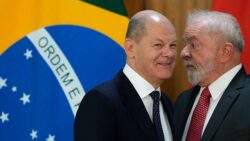More than 20 years after negotiations started, the European Union and Mercosur could finally ratify their trade deal this year.
Hope that the long-delayed deal could progress was renewed after the election in Brazil of leftist president Lula da Silva, who took office on 1 January and this week received German Chancellor Olaf Scholz in Brasilia.
Both leaders endorsed speeding up the ratification of the deal at press conferences.
Negotiations between the two blocs — Mercosur includes Brazil, Argentina, Uruguay and Paraguay — started in 2000 and were concluded in June 2019.
But the EU decried the “assault” on the Amazon rainforest under the leadership in Brazil of right-wing President Jair Bolsonaro, whose administration allowed deforestation of the rainforest for mining and agricultural activities at three times the rate observed more than a decade ago.
“I don’t think a deal would have been possible with former President Bolsonaro. Now he is gone and there is a new government, so it will be easier,” German MEP Anna Cavazzini (Greens), who is the vice-chair of the delegation for relations with Brazil, said.
“Nevertheless, most of the members of the European Parliament have made it clear that they want binding and enforceable sustainability criteria, they want the agreement not to contribute to deforestation and they want some guarantees,” the lawmaker stressed in an interview with Euronews.
Trade deals on the EU’s agenda
Now Lula da Silva is advocating for a more sustainable economic development model, including in the Amazon forest, often described as the lung of the planet. Scholz said that Germany will again contribute to the International Amazon Fund (created in 2006 by Lula da Silva), with a new disbursement of EUR35 million.
On the EU side, 2023 also offers a favourable setting closer ties, Udi Dadush, a non-resident fellow at the Bruegel think tank and author of the in-depth analysis “The EU-Mercosur Free Trade Agreement: prospects and risks”, said.
“The current Swedish presidency of the EU is very pro-trade, and the coming Spanish presidency (in the second half of the year) will also be very supportive of the agreement because of the historical ties with the three Spanish-speaking countries, with Brazil being Portuguese speaking,” the analyst told Euronews.
But even with this new approach to biodiversity conservation and the fight against climate change in Brazil, the EU-Mercosur agreement has long been overshadowed by criticism from political and economic groups, and may entail additional joint protocols.
By eliminating bilateral tariffs, the two sides should gain more export capacity to a combined market of 780 million people, but some sectors are sensitive, especially agriculture, and in particular the meat sector — beef and poultry will not be fully liberalised, for instance.
“In fact, some agricultural exports from Mercosur countries will increase and this poses a threat to agriculture in Europe, which is already under a lot of pressure. Many of these deals need to be looked at sector by sector, and we need to balance these different interests. We need to design trade agreements in a better way, so that they benefit as many groups as possible,” MEP Cavazzini said.
The shadow of China
In recent years, China has become Mercosur’s biggest trading partner and Lula da Silva wants to discuss the conditions for a trade agreement with Beijing during his visit to the country in March.
The EU therefore needs to step up dialogue with Mercosur and is keen to boost imports of mineral resources that are crucial for the so-called green industrial revolution and where China has a dominant position.
“One of the effects of the war in Ukraine and the pandemic has been to make everyone much more sensitive to the security of supply lines and the availability of materials of all kinds,” explained Udi Dadush.
“If you can cement that relationship, make it more secure, that’s part of ensuring diversification and security of supply for Europe. The same, by the way, would be for Latin America,” the analyst added.
The free trade agreement is one of the two parts of the global Association Agreement between the EU and Mercosur. The second pillar is a political agreement, which was closed in June 2020. Once the final version of the treaty is closed and translated into all EU languages, the text can be submitted to the European Parliament.
Only after that, ratification by all EU member states (and Mercosur states) will start so it can come into force. As the previous trade agreements with Canada, Japan and others powers, this is considered a milestone if the EU wants to implement the Green Deal and protect multilateralism.





